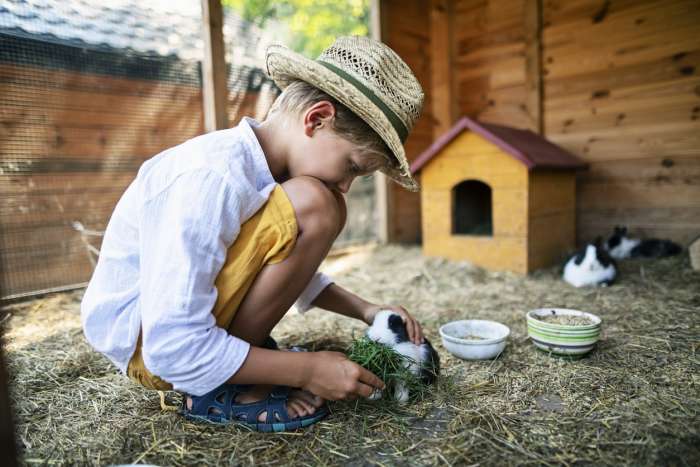Are you thinking of buying a rabbit for your next family pet?
A bunny for kids can be a wonderful experience, but it’s important to do your research first.
Visit any animal shelter after Easter, and you’ll find dozens of bunnies that were adopted by families with good intentions, but without any understanding of what rabbit ownership involves.
A rabbit can be the perfect pet for kids, but they’re definitely different from dogs and cats. Understanding the responsibilities of caring for rabbits before you bring one home will make your relationship with your family bunny a long and happy one.
Related: How Pets Can Impact Kids Mental Health
What to Consider Before Buying a Rabbit for Kids
Fluffy bunnies look like soft toys, so it might be tempting to pick one up for your toddler. However, there are many reasons that the House Rabbit Society doesn’t recommend rabbits for families with young children under seven years old.
Here are a few reasons why rabbits might not be the right pet choice for young children.
Rabbits are fragile
Rabbits are surprisingly fragile. Much more so than dogs and cats.
If a rabbit is grabbed the wrong way, squeezed too hard or dropped, it often means broken bones. And for a rabbit, broken bones are often the end.
Unlike cats and dogs, rabbits are prey animals. They’re easily frightened by loud noises or someone playing with them too roughly
Rabbits can actually die of fright. So you must teach your kids to play with them gently and not startle them.
Most bunnies don’t like to cuddle
In the wild, lots of different animals eat rabbits. This means that when someone picks a rabbit up, the rabbit’s first thought is that it’s about to be eaten. Most rabbits will kick, scratch and bite to get away, possibly injuring themselves, you or your child.
With care, consistency and lots and lots of time, you may get your rabbit to come to you to be petted, but most bunnies don’t enjoy being held. This doesn’t mean that they won’t love you, but bunnies show love differently — and we’ll talk about that in a bit.
Rabbits are not low-maintenance pets

Just because they’re small doesn’t mean they’re simple. Rabbits are incredibly intelligent. They’re social animals with complex health and nutritional needs. Rabbits also require a lot of space.
Bunnies want to be part of your family — on their terms. You can’t simply stick your bunny in a hutch and visit when you feel like it. A lonely or bored rabbit may become destructive, self-destructive or aggressive. This is why experts recommend having a pair, rather than a single bunny.
Rabbit nutrition can also be tricky. The wrong diet can lead to a variety of health problems, including gastrointestinal stasis, which is excruciatingly painful for the rabbit and often fatal.
You may hear experts say, “A hutch is not enough,” and it’s true. In addition to a safe “house,” rabbits need an enclosed run or other escape-proof, predator-proof space to race around, hop and stretch their legs when they feel like it.
Finally, many veterinarians don’t treat rabbits, so you may have to find an exotic animal vet, and that doesn’t come cheaply.
Why Rabbits Make Good Pets
Are you put off having a rabbit as a pet? Hopefully not, but it’s important to know what’s involved with feeding, housing and caring for your rabbit's health.
Rabbits can make amazing family pets. Here are just a few reasons why.
Bunnies are smart
There’s no such thing as a dumb bunny. Rabbits are sensitive and intelligent. Once you’ve won your rabbit’s trust, you can play with it and teach it tricks. And learning how to read a bunny's body language can make you smarter, too.
Bunnies are fun
Rabbits love to play. Their games are different from games that you might play with your cat and dog, though. Remember, cats and dogs are predators, but rabbits are prey. So no chasing or loud noises.
But mischievous bunnies love a good game of “bunny thief.” This is where you sit still and pretend not to see your bunny coming to snatch a treat or toy out of your hand. Many buns also like to play fetch — only they’ll be throwing and you’ll be fetching.
As for tricks, you can use a clicker to train your bunny to do tricks like you’d train a dog. Bunnies can also do some of the tricks dogs can, like jumping through a hoop, coming when you call and giving you a high five.
Bunnies are clean and quiet
Rabbits love the quiet life. They can be taught to use a litter box, which makes cleanup easy for everyone.
Bunnies are loving
Yes, your bunny will love you. But that love won’t look like human love, or even dog or cat love. So it’s important to learn what to look for so that when they say they love you, you won’t miss it!
Happy bunnies like to “binky.” They jump in the air and twist around. This means they’re happy to be with you and just happy to be alive. Check it out.
Your bunny may run in circles around you. This is a declaration of love. If your rabbit flops down on its side or lies down near you, it means they’re relaxed in your presence, and they trust you.
And if your rabbit nudges you with its head, you should definitely give them a gentle pat or a massage between the ears.
Best Rabbit Breeds for Kids and Families
You don’t have to have a specific breed of bunny to have a great family pet. Adopting a bunny from an animal shelter or rabbit rescue will literally save a life. It will also teach your children about the importance of spaying and neutering and adopting an animal for life.
However, some breeds are definitely more child-friendly than others. These include:
- French Lop
- Dutch
- Sussex
- Himalayan
- Florida White
- Japanese Harlequin
Mini-breeds and dwarf bunnies are cute, but because they’re quite fragile, they would make better pets for older children or teenagers. Some mini bunnies can also be quite spicy in terms of personality.
How to Choose a Healthy Rabbit
Before spending a lot of money on a breeder, try your local animal shelter or Petfinder.com, which can direct you to a rabbit rescue near you.
Healthy rabbits have:
- A glossy coat with no sores, scabs or dirty, matted patches (especially around the backside)
- Clean ears with no scratches, redness or dirt inside
- Bright eyes with no overflowing tears or discharge
- Clean nose with no discharge or snuffling
It will be natural for a rabbit to be fearful of you if it doesn’t know you, but if it shows aggressive behavior, such as lunging or biting, then you might consider another bunny.
Responsibilities of Owning and Caring for a Pet Rab]bit

Rabbit care has a lot of moving parts. But once you establish a bunny care routine, it can be pleasant for you and your rabbit. Here are the basics.
Diet
A rabbit’s diet should consist of at least 70 percent hay, preferably timothy hay. You can find this in most pet stores. It might be tempting to feed your bunny kibble alone, but doing so can lead to obesity and other problems.
You can also feed your bunny rabbit-safe vegetables and, occasionally, rabbit-safe fruit.
Housing
Should rabbits live indoors or outside? Different people have different opinions on whether rabbits are indoor or outdoor pets and both sides have valid arguments. However, no matter where they live, all rabbit quarters need the following:
Safety
Once you set up your bunny’s new home in the backyard, you may discover predators you hadn’t seen before. Research how to escape-proof and predator-proof your rabbit home.
Outdoor rabbits also need protection from the elements. You’ll need to protect your rabbits from all weather extremes, including cold, rain, wind and heat.
Indoor rabbits also face certain dangers. These include becoming stuck under furniture, caught in doors or moving furniture and being stepped on. Indoor rabbits should have their own rabbit-proof room.
Bunnies love to chew! Their chewing not only damages your possessions - but can lead to poisoning or electrocution if your bunny bites the wrong thing!
So if you have indoor buns, look into rabbit-proofing your home by covering your furniture legs, cords, cables and carpeting.
Exercise space
Wild rabbits may travel as much as three miles a day. Pet rabbits won’t go that far, but they do need daily access to a safe exercise space.
A hidey hole
Your new pet will feel safe and secure if it has somewhere in its enclosure where it can hide when it feels like being alone.
Hay and water
Rabbits need access to clean water and fresh hay 24/7.
Cleanup
Rabbits are tidy by nature, but you will need to scoop out the litter box daily. Use paper-based litter, wooden pellets or hay. And if you have a garden, bunny poop is one of the best fertilizers there is.
Grooming
Like cats, bunnies clean themselves. You should never give a rabbit a bath — it’s too stressful — but many rabbits enjoy being gently brushed with a wire brush.
You will need to trim your rabbit’s toenails every month, and many rabbits hate that. If your bunny doesn’t like having its nails done, it might be worth having your vet do it.
Healthcare
Read up on common rabbit health issues and know how to spot them. With most rabbit injuries and illnesses, time is of the essence, so register with a rabbit-savvy vet before you bring your new bunny home.
Common Misconceptions About Rabbits as Pets
We’ve covered most of the big ones, but to sum it up:
- Rabbits are super smart. They need mental stimulation to be happy
- Most bunnies don’t enjoy being held, but they do want to be part of the family — on their own terms
- Rabbits are social animals who need lots of interaction, so two are happier than one
- Bunnies are physically fragile and should be handled with care
- Rabbits can and do communicate with us — people just need to learn what to look for
Resources for Rabbit Owners
Bunny care can be complicated, but there are resources out there to help. Check out some of these.
The House Rabbit Society website has a wealth of information about rabbit care, behavior, food and overall care.
Petfinder.com can show you rabbits in your area who need homes. They also have a lot of great rabbit care information.
The Home and Roost blog has lots of information about rabbit care and what to expect from different rabbit breeds.
Your New Best Friend?
A rabbit can make a fantastic family pet, but they’re different from cats and dogs. Read up about rabbit care, and really think about whether a bunny is a good match for your family.



